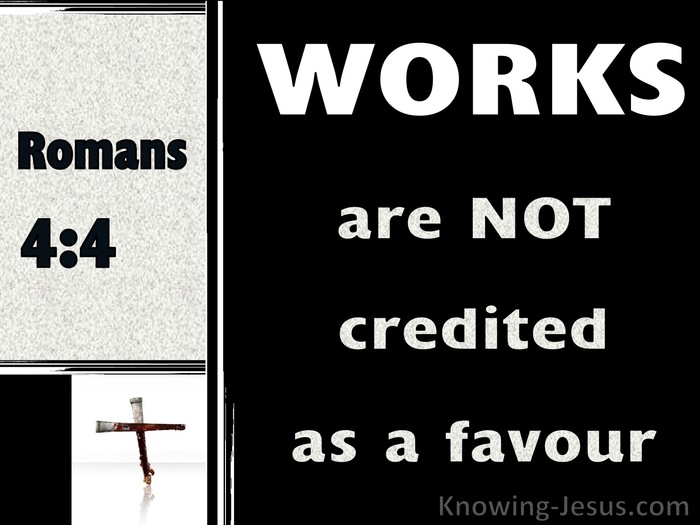Parallel Verses
The Emphasized Bible
Now, unto him that worketh, the reward is not reckoned by way of favour but by way of obligation,
New American Standard Bible
Now to the one who
King James Version
Now to him that worketh is the reward not reckoned of grace, but of debt.
Holman Bible
Now to the one who works,
International Standard Version
Now to someone who works, wages are not considered a gift but an obligation.
A Conservative Version
Now to the man being employed, the wage is not reckoned according to grace, but according to obligation.
American Standard Version
Now to him that worketh, the reward is not reckoned as of grace, but as of debt.
Amplified
Now to a laborer, his wages are not credited as a favor or a gift, but as an obligation [something owed to him].
An Understandable Version
Now wages are not considered a gift if the person has to work for them, but [rather] an obligation [of his employer].
Anderson New Testament
Now to him that works, the reward is not counted as a favor, but as a debt:
Bible in Basic English
Now, the reward is credited to him who does works, not as of grace but as a debt.
Common New Testament
Now to him who works, his wages are not reckoned as a gift but as his due.
Daniel Mace New Testament
the reward is not counted as a favour to him that has done good actions, but as a debt:
Darby Translation
Now to him that works the reward is not reckoned as of grace, but of debt:
Godbey New Testament
But to him that worketh, the reward is not reckoned according to grace, but according to debt;
Goodspeed New Testament
Now paying a workman is not considered a favor, but an obligation,
John Wesley New Testament
Now to him that worketh, the reward is not reckoned of grace, but of debt.
Julia Smith Translation
And to him working, the reward is not reckoned according to favor, but according to debt.
King James 2000
Now to him that works is the reward not reckoned of grace, but of debt.
Lexham Expanded Bible
Now to the one who works, his pay is not credited according to grace, but according to his due.
Modern King James verseion
But to him working, the reward is not reckoned according to grace, but according to debt.
Modern Spelling Tyndale-Coverdale
To him that worketh is the reward not reckoned of favour: but of duty.
Moffatt New Testament
Now a worker has his wage counted to him as a due, not as a favour;
Montgomery New Testament
Now if a man earn his pay by his work, it is not counted to him as a favor, but it is paid him as a debt;
NET Bible
Now to the one who works, his pay is not credited due to grace but due to obligation.
New Heart English Bible
Now to him who works, the reward is not counted as grace, but as debt.
Noyes New Testament
Now to him that performeth works, the reward is not accounted a matter of grace, but of debt;
Sawyer New Testament
But to one that works the reward is not accounted by grace but by debt.
Thomas Haweis New Testament
Now to him that worketh, the reward is not brought to account as a favour, but as a debt.
Twentieth Century New Testament
Now wages are regarded as due to the man who works, not as a favor, but as a debt;
Webster
Now to him that worketh, is the reward not reckoned of grace, but of debt.
Weymouth New Testament
But in the case of a man who works, pay is not reckoned a favour but a debt;
Williams New Testament
Now when a workman gets his pay, it is not considered from the point of view of a favor but of an obligation;
World English Bible
Now to him who works, the reward is not counted as grace, but as something owed.
Worrell New Testament
Now to him that works the reward is not reckoned as of grace, but as of debt;
Worsley New Testament
Now to him that worketh the reward is not reckoned as a favor, but as a debt:
Youngs Literal Translation
and to him who is working, the reward is not reckoned of grace, but of debt;
Themes
Bigotry » Paul's argument against
Grace » Justification by, opposed to that by works
the Reward of saints » Is of grace, through faith alone
Topics
Interlinear
De
Ergazomai
Logizomai
Logizomai
Kata
κατά
Kata
Usage: 428
References
Morish
Word Count of 37 Translations in Romans 4:4
Prayers for Romans 4:4
Questions on Romans 4:4
Verse Info
Context Readings
Abraham's Faith Counted As Righteousness
3 For what doth the Scripture say? And Abraham believed in God, and it was reckoned unto him as righteousness. 4 Now, unto him that worketh, the reward is not reckoned by way of favour but by way of obligation, 5 Whereas, unto him that worketh not but believeth on him that declareth righteous the ungodly, his faith is reckoned as righteousness.
Cross References
Romans 11:6
If, however, by favour, no longer of works; else, favour, no longer proveth to be favour!
Matthew 20:1-16
For the kingdom of the heavens, is like, a man, a householder, - who went forth with the morning, to hire labourers into his vineyard;
Romans 9:32
Wherefore? Because, not by faith but as by works, have they sought it : they have stumbled at the stone of stumbling,
Romans 11:35
Or who hath first given unto him, and it shall be recompensed to him again?



